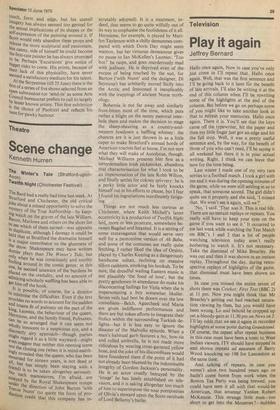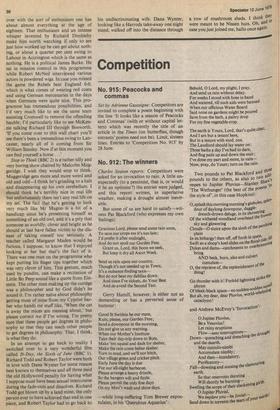Television
Play it again
Jeffrey Bernard
Hallo once again, Now in case you've only just come in I'll repeat that. Hallo once again. Well, that was the first sentence and I'll be going back to it later fiir the benefit of late arrivals. I'll also be writing it at the end of this column when I'll be rewriting some of the highlights at the end of the column. But before we go on perhaps some of you might like to take another look at that to refresh your memories. Hallo once again. There it is. You'll see that the keys came off the typewriter, hit the paper and then my little finger just got an edge and hit the full stop. Well, it was a pretty useful sentence and, by the way, for the benefit of those of you who can't read, I'll be saying it all weekend but there it is in your actual writing. Right. I think we can leave that now for the time being.
Last winter I made one of my very rare sorties to a football match. I took a girl with me and it was during the opening minutes of the game, while we were still settling in so to speak, that someone scored. The girl didn't quite see it properly and she said, 'I missed that. We won't see it again, will we?'
'No,' I. said. 'That was it. This is real life. There are no instant replays or repeats. You really will have to keep your eyes on the game if you want to see it.' It occurred to me last week while watching the Test Match on BBC's 1 and 2 that a lot of people watching television today aren't really bothering to watch it. It's not necessary. Take the dismissal of Mike Brearley. He was out and then it was shown in an instant replay. Throughout the day, during retrospective replays of highlights of the game, that dismissal must have been shown six times.
In case you missed the entire sextet of shots there was Cricket: First Test (BBC 2) at 11 pm. Now you might think that Mr Brearley's getting out had reached saturation viewing by then, but you would have been wrong. Lo and behold he cropped up yet a-bloody-gain at 11.30 pm on News on 1. I'll lay odds that we see it again in recorded highlights at some point during Grandstand. Of course, the repeat after repeat business in this case must have been a tonic to West Indian viewers. ITV should have stepped in and shown repeats ad nauseant of Barry Wood knocking up 198 for Lancashire at the same time.
And talking of repeats, in case you weren't alive two hundred years ago or hadn't come home from work when the Boston Tea Party was being brewed, you could have seen it all with that would-be American, that amateur Yankee Robert McKenzie. This strange little man—too short to get into the Mounties ?—bubbles over with the sort of enthusiasm one has about almost everything at the age of eighteen. That enthusiasm and an intense whisper invented by Richard Dimbleby make him worth watching if only to see just how worked up he can get about noth ing, or about a quarter per cent swing to Labour in Accrington which is the same as nothing. He is a political James Burke. He sat in mission control in this programme while Robert McNeil interviewed various actors in powdered wigs. In case you missed the game the Rebels beat England 6-0, which is what comes of wearing red coats and using German mercenaries in the days when Germans were quite nice. This pro gramme has tremendous possibilities, and I'd very much like to see the same team assisting Cromwell to remove the offending bauble; I'd particularly like to see McKen
zie talking Richard III through Bosworth. 'If you come over to this wall chart you'll
see there's been a tremendous swing to Lancaster, nearly all of it coming from Sir William Stanley. Now if at this moment you can find yourself a horse ..
Stop to Think (BBC 2) is a rather silly and very boring show chaired by Malcolm Mug
geridge. I wish they would stop to think.
Muggeridge gets more and more weird and old and odd—I think he's grinding to a halt and disappearing up his own cerebellum. I should think he's terribly nice in real life but unfortunately there isn't any real life on my set. The fact that he's getting to look very much like Mr Magoo is a bit of a handicap since he's presenting himself as something of an old owl, and it's a pity that someone as worldly, clever and bright as he should at last have fallen victim to the dis ease of taking oneself too seriously. A teacher called Margaret Maden would be furious, I suppose, to know that I enjoyed looking at her but that's the fact of it.
There was one man on the programme who kept putting his finger tips together which was very clever of him. This gesture, much used by pundits, can make a recitation of Little Bo Peep sound like a quote from Ein stein. The other man making up the cortege was a philosopher and by God didn't he sound it. I'm rather naïve about philosophy getting most of mine from my Cypriot bar ber who hands me stuff like, 'When the cat is away the mices are messing about,' but please correct me if I'm wrong. I'm pretty sure that these people get degrees in philosophy so that they can teach other people to get degrees in philosophy. That, I think, is what they do.
In an attempt to get back to reality I switched over to a very wonderful film called DDay, the Sixth of June (BBC 1). Richard Todd and Robert Taylor were both in love with Dana Wynter for some reason best known to themselves and all three paid the old Hollywood penalty for having what I suppose must have been sexual intercourse during the fade-outs and dissolves. Richard Todd got blown up by a land mine, the only person ever to have achieved that end in one piece, and Robert Taylor had to go back to
his undiscriminating wife. Dana Wynter, looking like a Harrods take-away one night stand, walked off into the distance through a row of mushroom sheds. I think they were meant to be Nissen huts. Oh, and in case you just joined me, hallo once again.



































 Previous page
Previous page